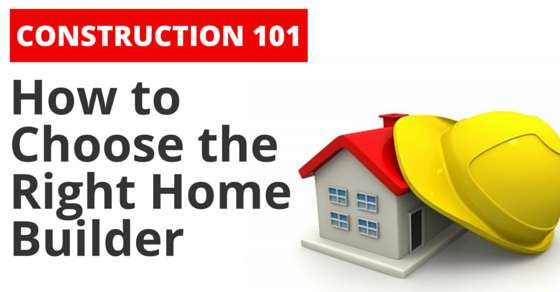Buying a home comes with its own distinct set of choices and options, but when you choose to build a new home, the amount of choices increase immensely. Your home builder is one of the most important. Here’s how to determine which one is right for you.
Image courtesy of bluebay at FreeDigitalPhotos.net
Determine what your type of build is.
This is a broad category, but it’s also necessary when considering new construction and looking for a builder to meet your expectations. While some builders are versatile in their home pricing, style and home type, others have found their niche in the construction market.
If your style leans toward modern-contemporary and your builder’s portfolio is filled with traditional architecture and building materials, you may want to look further for a better match.
Ask your builder how they differ from other area builders. You’ll want to know how their work sets them apart from the competition.
Determine if you want custom or production.
While both types of builders are excellent choices, each will deliver a different set of design options and building experiences.
A production builder typically works on several home builds simultaneously within a community, using a library of home designs. Most production home builders offer home and land as a package and offer a catalog of home plans and build homes priced for first-time homebuyers and upsizing or luxury buyers, according to the National Association of Home Builders (NAHB).
A custom builder creates one-of-a-kind homes and usually offers a broader range of design choices. With a custom home builder, buyers typically get to choose their location and are often more hands-on in the design process.
Ask about their warranty.
One of the biggest perks of buying a freshly built home is the knowledge that you won’t need a new roof, new windows, etc. for quite some time, but issues can come up that require attention and some capital, which is why you need to be aware of what your builder covers if that were to occur.
According to the Federal Trade Commission, many home warranties are backed by the builder and others are purchased by the builder from independent warranty companies. Some buyers even purchase an additional warranty to supplement the warranty offered by their builder.
Ask your builder for specifics on their warranty:
- What does it cover?
- How long does coverage last?
- How do they go about making the covered repairs?
Do your research.
A newly built home isn’t just about the finished product, but also the buyer’s experience throughout the building process. You’ll want to do your research on both aspects.
Ask a prospective builder for references, do walk-throughs of model homes (especially for production builders), and look into the resale values of the builder’s portfolio. Did they appreciate or maintain their value?
Discuss your needs and budget.
Make your preferences and price point known from the get-go and make sure your builder is dedicated to working with your budget range. Discuss what features come standard with the home build and what options are available for upgrading (and how that affects your pricing).
Get a timeline and an idea of their process.
Each home builder is different, but time is of the essence when you’re itching to get into your new home. According to the most recent Census Bureau Survey of Construction, the average completion time for a single-family home is approximately seven months.
Keep in mind that your home plans can greatly vary this estimation. For example, custom-built homes average 10 to 16 months for completion, according to New Home Source. Intricacy will affect timeliness on the builder’s part, but your role as a homebuyer also comes into play.
You’ll want to discuss when you have to have all of your final preferences completed and how your builder will approach any changes you want made. For instance, ordering countertops can take several weeks and if your decision is made or changed last minute, you’ll need to understand how that affects your home’s completion date.
A home purchase, whether new or existing, is likely to be the biggest purchase you’ll make in your lifetime, so it’s pertinent to understand the process of a new build. These initial steps will help you better understand how and when decisions need to be completed and give you confidence throughout the building progression.
To learn more about financing your newly built home, download our free Rehab & Construction Guide.
